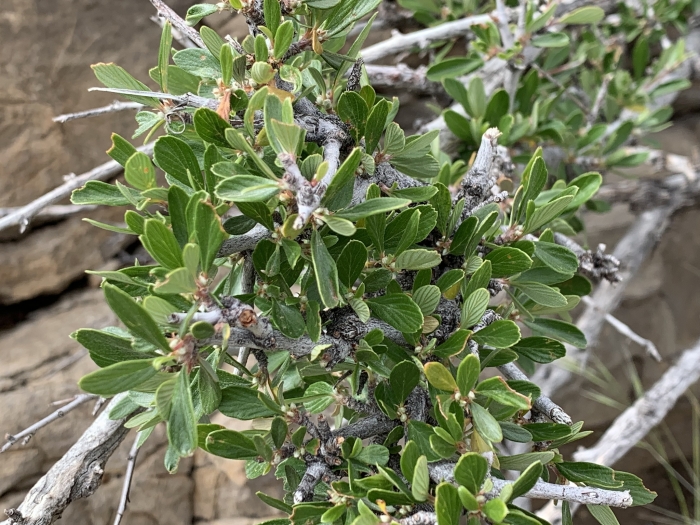Hairy Mountain-Mahogany
(Cercocarpus montanus var. paucidentatus)
Hairy Mountain-Mahogany (Cercocarpus montanus var. paucidentatus)
/
/

CK Kelly
CC BY 4.0
Image By:
CK Kelly
Recorded By:
Copyright:
CC BY 4.0
Copyright Notice:
Photo by: CK Kelly | License Type: CC BY 4.0 | License URL: http://creativecommons.org/licenses/by/4.0/ | Rights Holder: CK Kelly | Publisher: iNaturalist | Date Created: 2019-05-10T23:38:05Z |



















































Estimated Native Range
Summary
Cercocarpus montanus var. paucidentatus, commonly known as Hairy Mountain-Mahogany, is a deciduous shrub native to the semi-arid regions of the Southwestern USA, including the Rocky Mountains, and extending into Northwest Mexico. It is adapted to dry, rocky slopes and canyons, often found in chaparral and pinyon-juniper woodlands. This shrub typically grows to a height of 10-18 feet (3-5.5 meters) and can spread up to 25 feet (8 meters) wide. Hairy Mountain-Mahogany is characterized by its intricate branching pattern, small leathery leaves, and hairy twigs. The small, inconspicuous flowers bloom in spring and are followed by feathery, plumed fruits that are quite distinctive and add ornamental interest.
This plant is valued for its drought tolerance and ability to thrive in poor soils, making it an excellent choice for xeriscaping and naturalistic plantings in arid regions. It is also used for erosion control on slopes and in restoration projects. Hairy Mountain-Mahogany requires minimal maintenance once established and is suitable for full sun to part shade locations. It prefers well-drained soils and is tolerant of a range of soil types, from sandy to loamy. While generally disease-free, it can be susceptible to root rot if overwatered.CC BY-SA 4.0
This plant is valued for its drought tolerance and ability to thrive in poor soils, making it an excellent choice for xeriscaping and naturalistic plantings in arid regions. It is also used for erosion control on slopes and in restoration projects. Hairy Mountain-Mahogany requires minimal maintenance once established and is suitable for full sun to part shade locations. It prefers well-drained soils and is tolerant of a range of soil types, from sandy to loamy. While generally disease-free, it can be susceptible to root rot if overwatered.CC BY-SA 4.0
Plant Description
- Plant Type: Shrub
- Height: 6-8 feet
- Width: 4-6 feet
- Growth Rate: Moderate
- Flower Color: N/A
- Flowering Season: Summer, Fall
- Leaf Retention: Deciduous
Growth Requirements
- Sun: Full Sun, Part Shade
- Water: Low
- Drainage: Medium, Fast
Common Uses
Bee Garden, Bird Garden, Butterfly Garden, Deer Resistant, Drought Tolerant, Fragrant, Low Maintenance
Natural Habitat
Semi-arid regions, chaparral, and pinyon-juniper woodlands
Other Names
Common Names:
Scientific Names: , Cercocarpus montanus var. paucidentatus, Cercocarpus eximius, Cercocarpus parvifolius var. paucidentatus, Cercocarpus breviflorus var. eximius,
GBIF Accepted Name: Cercocarpus montanus var. paucidentatus (S.Watson) F.L.Martin